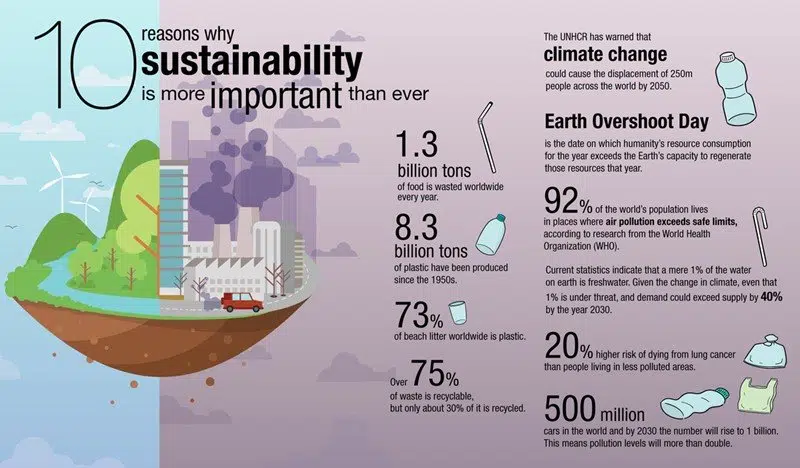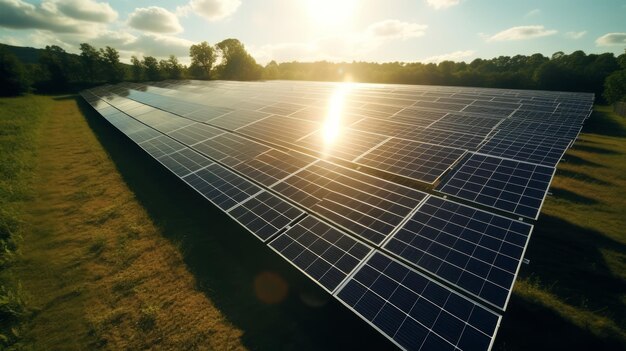
Why is Sustainability Important for Our Future? Understanding Its Critical Role
Have you ever wondered what the buzz around "sustainability" is all about? It’s more than just a trendy word; it’s a fundamental concept that holds the key to a healthy, prosperous, and fair future for everyone on Earth. In simple terms, sustainability is about meeting our needs today without making it harder for people in the future to meet their own needs. It’s about finding a balance between what we take from the planet and what we give back, ensuring that our actions don’t harm the generations to come.
But why is this balance so incredibly important for our future? Let’s dive deep into the crucial reasons why embracing sustainability isn’t just an option, but a necessity.
What Exactly is Sustainability? (The Basics for Beginners)
Before we explore its importance, let’s break down what sustainability really means. It’s often described as having three main pillars:
- Environmental Sustainability: Protecting our natural resources and ecosystems. This includes clean air, water, healthy soil, and thriving wildlife. It’s about reducing pollution, conserving energy, and managing waste.
- Social Sustainability: Ensuring fairness, equality, and well-being for all people. This means having access to education, healthcare, safe working conditions, and a strong community where everyone’s voice is heard.
- Economic Sustainability: Creating economies that are fair, efficient, and can last over the long term. It’s about promoting responsible growth that doesn’t deplete resources or harm the environment, while also providing good jobs and opportunities for everyone.
Think of it like a three-legged stool: if one leg is missing or too short, the stool won’t stand properly. All three pillars need to be strong and balanced for true sustainability.
The Critical Reasons Why Sustainability Matters for Our Future
Now, let’s explore the profound impact sustainability has on shaping the world we leave behind.
1. Protecting Our Planet: The Foundation of All Life
Our planet is our home, and its health directly impacts our own. Unsustainable practices are pushing Earth’s systems to their limits.
- Combating Climate Change: This is perhaps the most urgent challenge. Burning fossil fuels (coal, oil, gas) for energy releases greenhouse gases, trapping heat and causing global warming. This leads to more extreme weather events (floods, droughts, heatwaves), rising sea levels, and disruptions to ecosystems.
- Why Sustainability Helps: Shifting to renewable energy sources (solar, wind), improving energy efficiency, and protecting forests (which absorb CO2) are sustainable solutions that reduce emissions and slow climate change.
- Preserving Biodiversity: Earth is home to millions of species, from tiny insects to giant whales, all playing a role in complex ecosystems. Habitat destruction, pollution, and climate change are causing species to disappear at an alarming rate.
- Why Sustainability Helps: Sustainable land use, conservation efforts, responsible fishing, and reducing pollution protect habitats and allow diverse species to thrive, which is vital for healthy ecosystems that provide us with food, medicine, and clean air.
- Reducing Pollution: Our air, water, and soil are becoming increasingly polluted by industrial waste, plastics, pesticides, and other harmful substances. This pollution directly impacts human health and destroys natural habitats.
- Why Sustainability Helps: Sustainable practices focus on waste reduction (reduce, reuse, recycle), developing non-toxic alternatives, and implementing cleaner production methods to minimize environmental contamination.
2. Ensuring Resource Availability: A Finite World, Infinite Needs?
Our planet has finite resources – meaning there’s a limited amount. If we keep using them up at our current rate, we’ll run out, impacting everything from our food supply to our energy needs.
- Water Scarcity: While Earth is mostly water, only a tiny fraction is fresh and easily accessible for drinking, farming, and industry. Many regions already face severe water shortages.
- Why Sustainability Helps: Sustainable water management includes conserving water, improving irrigation techniques, reusing wastewater, and protecting natural water sources.
- Food Security: Feeding a growing global population is a massive challenge. Unsustainable farming practices deplete soil, use excessive water, and rely heavily on chemicals, leading to less fertile land and reduced crop yields.
- Why Sustainability Helps: Sustainable agriculture focuses on organic farming, crop rotation, water-efficient irrigation, and protecting pollinators, ensuring we can grow enough healthy food for everyone in the long term.
- Energy Depletion: Most of our current energy comes from fossil fuels, which are non-renewable and will eventually run out.
- Why Sustainability Helps: Investing in renewable energy sources like solar, wind, hydro, and geothermal power ensures a continuous and clean energy supply for the future, reducing our reliance on finite resources.
3. Promoting Human Health and Well-being: A Healthier You, A Healthier Planet
The health of our environment is inextricably linked to our own health and quality of life.
- Cleaner Air and Water: Reducing pollution directly translates to fewer respiratory illnesses, cleaner drinking water, and healthier ecosystems that provide us with essential services.
- Safer Food Systems: Sustainable agriculture reduces the use of harmful pesticides and chemicals, leading to healthier food that is safer to eat.
- Stable Communities: When resources are scarce and environmental problems worsen, it can lead to conflict, displacement, and increased poverty. Sustainability helps create more stable, resilient communities.
- Mental Well-being: Access to green spaces, clean environments, and a sense of security about the future can significantly improve mental health and overall happiness.
4. Driving Economic Growth and Innovation: A Greener, Richer Future
Sustainability isn’t just about saving the planet; it’s also about smart economics and creating new opportunities.
- New Industries and Jobs: The shift towards a sustainable economy creates entirely new sectors, such as renewable energy technology, green building, sustainable agriculture, and eco-tourism. This generates millions of new jobs and fosters economic growth.
- Increased Efficiency and Savings: Sustainable practices often mean using fewer resources, reducing waste, and improving energy efficiency. This translates directly into cost savings for businesses and households alike.
- Innovation and Technology: The challenges of sustainability push us to innovate and develop cutting-edge technologies and solutions, from advanced recycling methods to carbon capture technologies. This drives progress and creates competitive advantages.
- Long-Term Economic Stability: Economies that are reliant on depleting resources or that ignore environmental damage are inherently unstable. Sustainable economies are more resilient to shocks and better positioned for long-term prosperity.
5. Building a Fairer, More Equitable Society: Justice for All
Sustainability has a strong social justice component. The impacts of environmental degradation often disproportionately affect the poorest and most vulnerable communities, who have contributed the least to the problem.
- Intergenerational Equity: Sustainability ensures that future generations have the same opportunities and resources that we do. It’s about not burdening them with our environmental debt.
- Social Justice: Addressing issues like access to clean water, breathable air, and healthy food for all is a core part of social sustainability. It means ensuring that environmental benefits and burdens are shared fairly.
- Empowerment: Sustainable development often involves empowering local communities, giving them a voice in decisions that affect their environment and livelihoods.
6. Creating a Resilient Future: Adapting to Change
The world is constantly changing, and we’re already seeing the effects of climate change and resource depletion. Sustainability helps us build resilience – the ability to bounce back from challenges.
- Adapting to Climate Impacts: Sustainable infrastructure (like green buildings, permeable pavements, and protected coastlines) can help communities better withstand extreme weather events.
- Diversifying Resources: Relying on a mix of energy sources and food production methods makes us less vulnerable to disruptions in any single supply chain.
- Community Strength: Strong, sustainable communities are better equipped to face and recover from environmental, economic, or social shocks.
How Can We Be More Sustainable? (Actions for a Better Tomorrow)
The good news is that everyone, from individuals to governments, can contribute to a more sustainable future.
- Individual Actions:
- Reduce, Reuse, Recycle: Cut down on waste, choose reusable items, and sort your recycling correctly.
- Conserve Energy: Turn off lights, unplug electronics, use energy-efficient appliances, and consider walking or biking instead of driving.
- Save Water: Take shorter showers, fix leaks, and water plants efficiently.
- Eat Sustainably: Reduce meat consumption, choose local and seasonal produce, and minimize food waste.
- Shop Responsibly: Buy products from companies committed to ethical and sustainable practices.
- Community Actions:
- Support local farmers’ markets and businesses.
- Participate in community clean-ups or tree-planting initiatives.
- Advocate for public transport, bike lanes, and green spaces.
- Join or start a local sustainability group.
- Business Actions:
- Adopt renewable energy sources.
- Implement waste reduction and recycling programs.
- Design products for longevity and recyclability.
- Ensure ethical supply chains and fair labor practices.
- Report on their environmental and social impact.
- Government Actions:
- Invest in renewable energy infrastructure.
- Implement policies that incentivize sustainable practices (e.g., carbon taxes, subsidies for green tech).
- Protect natural areas and enforce environmental regulations.
- Promote environmental education and awareness.
- Support international agreements on climate change and conservation.
The Bottom Line: Your Role in Shaping the Future
Sustainability is not just an environmental issue; it’s a holistic approach to building a better world for everyone. It’s about recognizing that our planet’s health, our economic stability, and our social well-being are all deeply interconnected.
Every choice we make, big or small, has an impact. By understanding why sustainability is so important and by taking conscious steps in our daily lives, we contribute to a collective movement that is shaping a future where both humanity and nature can thrive. The future is not something that just happens; it’s something we create, together. Let’s make it a sustainable one.



Post Comment